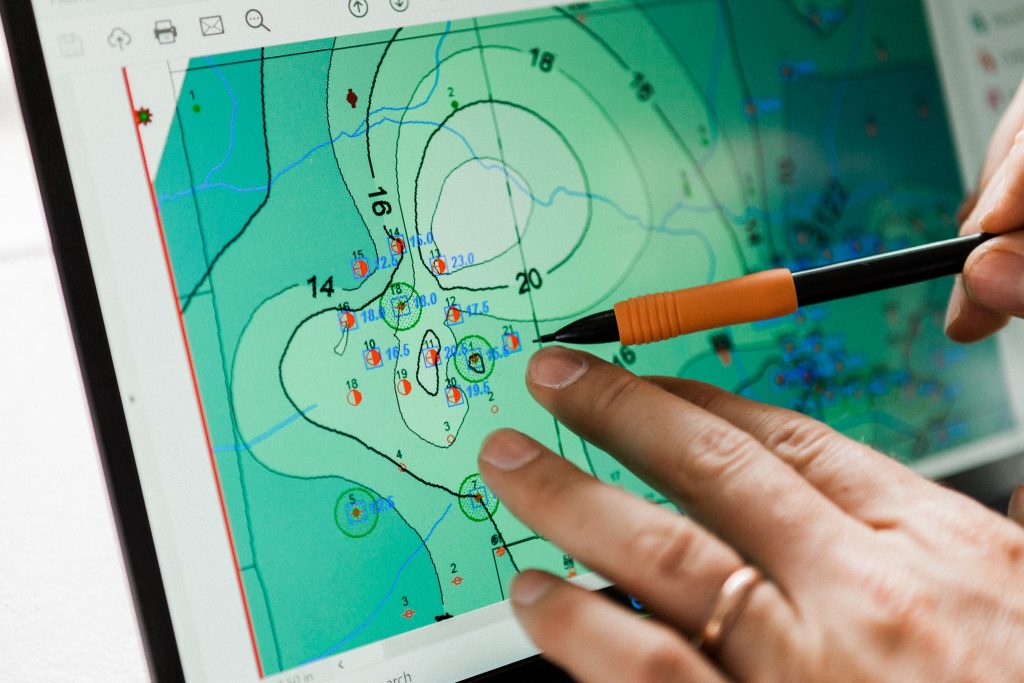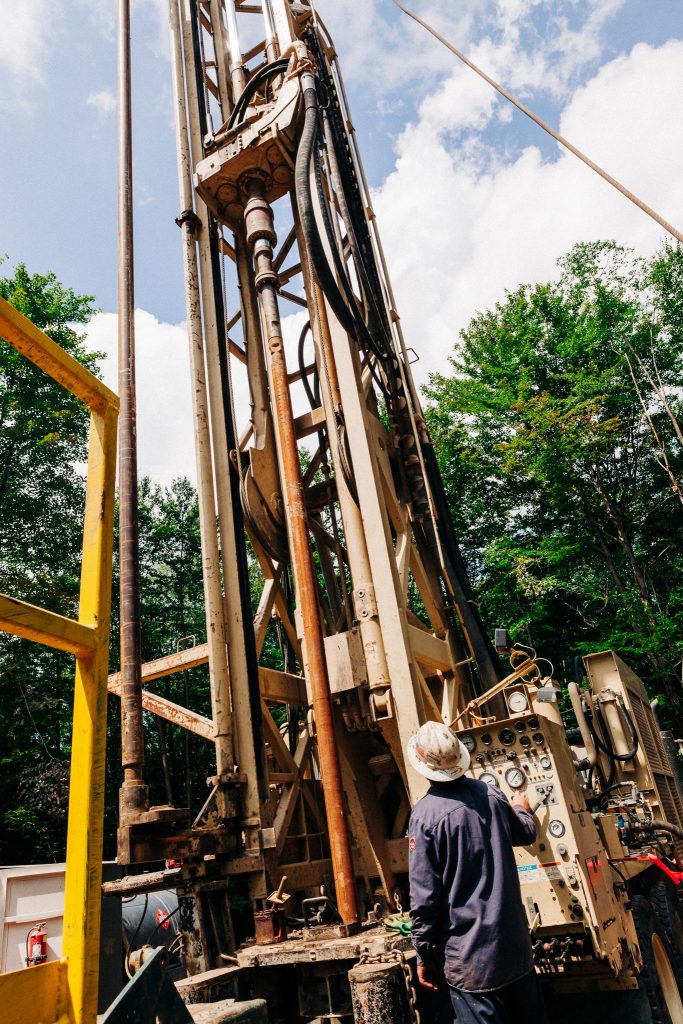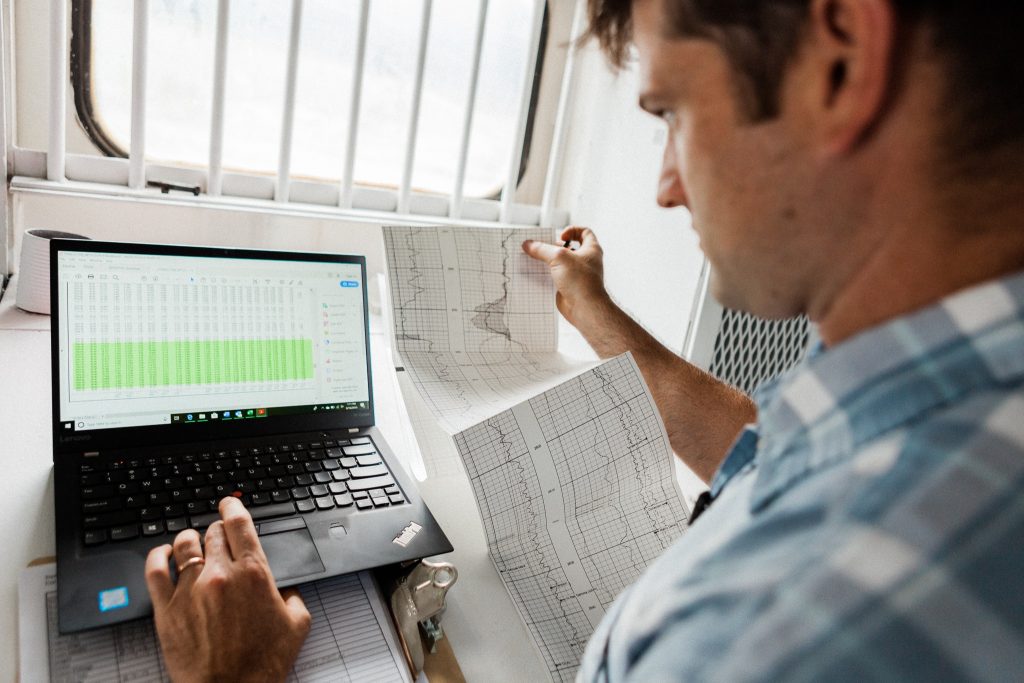Paul Morris has energy in his DNA. It started when his great-grandfather CJ Morris dropped out of school in 7th grade to support his family when his own father died. When his great-grandfather went into business for himself, he moved drilling rigs with horses around the Bradford, PA area, which was a boom town in McKean County at the turn of the century. He would disassemble a wooden rig, piece by piece, by hand, and move the pieces to another job site by horse and wagon and then rebuild the rig. A few decades later, his son Tom took over, providing jobs for the greatest generation when they came home from war. By then the horses had turned into bulldozers and trucks, and the rigs were made of iron, but the work was just as hard and as necessary as ever. In 1979, new air rotary drilling technology was cutting edge, allowing drilling companies to drill wells faster. Paul’s father Tom Jr. steered the company in that direction and grew it steadily for several decades.
So for four generations, the Morris family has been part of the energy solution, helping to do more than just heat homes and power vehicles.
But even with their long-standing pedigree of responsible drilling, involvement in the community and honest hard work, Paul gets it if you don’t like what he does.
The F-word has that effect on people.
He’s met me on a Sunday morning in his office at the Incubator in the 200 Building of Innovation Park for our interview. The weather is cool, the coffee is strong, and the mostly empty floor is weekend quiet. In other words, it’s a perfect atmosphere to have an open conversation about a controversial topic: fracking.
“There are 7.5 billion people alive in this world,” Paul says. “We can talk about driving cars, and heating or cooling homes, but that’s only a small part of the discussion. It’s not often that you have to think about the energy demand of 7.5 billion people, but when you dive in, you realize what humankind has done with oil and gas in the last 150 years is remarkable.”
“Think about the massive and complex supply chain needed to grow, process, and transport enough crops and livestock to feed and clothe the world. Oil and gas is integral for that. Think about the amount of steel, glass, concrete, plastic, asphalt, etc. and the number of machines used every day to build and repair our cities – it’s almost incomprehensible but that’s all possible because oil and gas provides the power and source material.”
He goes on to say: “It’s not just agriculture and manufacturing – our hospitals and emergency devices require uninterrupted electricity to keep people alive every second of the day. Right now only oil and gas can fully meet that demand.”
Fracking is controversial, but it needs to be discussed in the context of providing affordable, abundant, and reliable energy and source material.
Paul grew up in the family’s business. He remembers driving bulldozers when he could barely see over the engine hood. He got his CDL at 18, the earliest age allowed, and he loved every part of the business. He chose to attend Allegheny College and majored in Geology and Economics, graduating in 2007, which would turn out to be a groundbreaking year in the energy world.
In the same year, Penn State geology professor Terry Engelder, known as “the Father of the Marcellus Shale,” is credited with doing the first calculations that showed that there were roughly 489 trillion cubic feet of recoverable natural gas in the Marcellus Shale. His calculations, along with technological advances, gave drillers the confidence to give Marcellus a try, and it resulted in one of the largest energy booms in the country’s history.

Oil and gas production has always been part of Pennsylvania’s rich history, but now there was a change and it produced a modern day gold rush. Marcellus Shale was the play and fracking was all the news. The unprecedented growth of the industry brought a lot of good to the area, but with it came a level of scrutiny over the management of earth’s resources that was also unprecedented. To help, Penn State formed the Marcellus Shale Education and Training Center in October of 2008, providing a variety of resources to PA communities and the oil and gas industry members.
Paul graduated into a world that was hyper-aware of fracking… and many folks were opposed to it. He went straight to work, knowing that his family business was something that not everyone understood or agreed with. “Not everyone wants to have a discussion about fossil fuels or fracking, and that’s OK,” he says. “But when they do, I tell them it’s needed because alternatives are not yet practical. Fracking is a complicated solution to a really complicated problem.”
Let’s say you are one of the people willing to have this discussion. “Fracking is a technological achievement that enables the oil and gas industry to more completely and efficiently extract oil and gas from the subsurface rock and get it to market,” Paul says. “In many ways this industry is like every other – there is a right way to do things and a wrong way to do things. There are companies who have done the wrong thing (whether by accident or not), and they have given the entire industry a black eye. Fracking responsibly, which is what most operators do, is a direct benefit to the enormous effort undertaken every day to provide fundamental human needs to the people in the world. Affordable, abundant, and reliable energy is important, and it matters to people.”
Paul was put in charge of the family operation by the time he was 25.
In the new boom, he chased drilling rigs in Pennsylvania, Ohio, West Virginia, and New York. “I had to be everywhere at once,” he says. He decided his last day at the family business would be the day he married his wife, Hannah. In 2015, when they came back from their honeymoon, he set out to work on his own.
His family’s company worked primarily as a contractor to oil and gas companies, but Paul was ready to move out and work as a producer. He had the skill set, contacts, and background in operations and geology. He thought “the risk of not doing it seemed greater than the risk of doing it and failing.”
And from generations of hard-working men and women, Blackhawk Energy was formed

It was a tough start for the new couple. “It was a lot harder to start the company than I thought it would be. It was hard to secure the right acreage. On top of that, we gave up my salary, health insurance, and company vehicle. We shared an old car, a lot of student debt, and the promise to make it work – together.”
Late the following year Paul was introduced by a good friend to a petroleum engineer alum from PSU, Larry DeFluri. “Larry and I were both at the right place at the right time and we decided to partner. We founded Blackhawk Energy, LLC because we both wanted to build a first-class oil and gas exploration, development, and production company,” Paul says. “Our partnership works first and foremost because we have the same core values and we agree on our mission and vision.”
He and Hannah drew a circle around their home in McKean County as they looked for a place to live. “We needed a fresh start but wanted to be within a few hours of home because that’s where our family is and that’s where the drilling is – we considered Buffalo and Pittsburgh but, ultimately, we decided on State College,” Paul says. “Hannah had great employment opportunities here and the University was able to provide talent, resources, and support. Generally speaking, State College is a very smart place. The people are optimistic and ambitious and involved. The community is diverse, and we love the hometown feel. We especially appreciate what the area has to offer for kids. We’re here because it’s a great place to raise a family.”
It was a great move.
“I work between two locations that completely complement one another,” Paul says. “On the one hand we have employees, contractors, and suppliers in McKean County where virtuous hard work and natural resource development is part of the fabric of the community. Then, here in State College, I am surrounded by extremely smart administration and an unbelievably supportive community at Innovation Park and the University. Together, it’s a network of people who are really invested in making sure Blackhawk succeeds.”
Innovating the next chapter in energy
Blackhawk found a home at 200 Technology Center at Innovation Park; it’s been great for the company, Paul says. “The building management and staff truly care about the success of the tenants and they prove it again and again daily. They offer support in the form of affordable office space, business and administrative support and coaching, and for us, they opened up their personal Rolodexes to connect us with our banking partners, as well as our first Joint Venture partner (Bulldog Capital Investments of State College) which quite literally moved our company to the next level.”
These personal connections paired with professional support have been crucial in Blackhawk’s growth. “Start-ups require a lot of help,” Paul says, “and it’s all hands on deck all the time. To have a place that lends a helping hand is invaluable. It’s a resource I certainly don’t take for granted.”
Innovation Park Director Dan Leri assisted Paul with settling into the Park and getting connected to the local business owner ecosystem and resources. “The energy sector is an extremely complicated foundational component of our country’s economy,” Dan says. “Complex outcomes, like a long-term energy strategy that needs to evolve toward renewable sources, requires smart young leaders in both fossil fuels and renewables. Give me 50 more people like Paul Morris and we all will feel more confident about a structured, ethical, and environmentally responsible evolution of our energy and lubricant sectors in this country.”
The proximity to the University allows Blackhawk to continue the collaboration that Paul started in 2003. Dr. Bob Watson (Associate Professor Emeritus – Penn State), who has supported Paul’s efforts since he was in high school, and Dr. John Wang, (Associate Professor of Petroleum and Natural Gas Engineering) have worked closely with the company as they discuss projects to evaluate acquisitions, enhance oil and gas recovery methods, and improve drilling and completions techniques. The company has access to Penn State labs and help from undergraduates for various projects, and they in turn have granted the University access to their leases so undergraduates in Petroleum and Natural Gas majors can experience hands on education. One recent graduate is completing some post-graduate work before starting full time with Blackhawk.“It’s a great community for entrepreneurs, business start-ups, and seasoned professionals to tap into. It’s a win/win,” Paul says. Dan Leri agrees. He believes the happy collisions of good people are key for young people and new companies to succeed. “Combining the deep craft of seasoned scientists and business talent with the fresh eyes of a hardworking and dedicated talent like Paul greatly increase the chances of business success.”
Being situated close to an epicenter of invention and innovation has other benefits to the company. Paul and his team are in tune with energy innovations as they change, which they’re hoping will lead to exciting new opportunities.
“Our mission states that for as long as fossil fuels are needed, Blackhawk Energy will be accountable to the public for responsibly producing oil, gas, and their constituents in order to satisfy those needs,” Paul says.
I ask him what makes his company stand out.
“Nothing,” he says.
I push back, because what I’ve heard so far doesn’t sound like nothing.
“You don’t have to stand out,” he says. “You just have to tell the truth and do your job really well.”
And that’s exactly what he’s doing. He’s assembled a team from his two talent bases in State College and McKean County. “I knew all I needed were good people and good rock. And now we have both.”
When the House is in session in Harrisburg, he drives 90 minutes to have discussions with representatives and leaders who are interested in or curious about responsible fracking and energy production. “Their job is to represent the people of our state in a way that appeals to their voters. It’s always good to engage with people on this subject – even those who are ideologically opposed to using fossil fuels. You can go deeper than the manufactured talking points from both sides and end up having a meaningful conversation about the complexity of delivering affordable, abundant, and reliable energy which is vital to survive and thrive. That’s a big deal.”
When he looks ahead at the next step for the company, his mantra comes back into play. “We just keep doing what we say and saying what we do. We want to keep producing oil and gas in a way that’s thoughtful, efficient, and orderly. My bottom-line goal is to create a company that my daughter will be proud of. I want to work with her in the same way I’ve been able to work with my dad. I want her to work with her grandpa just like I was able to do. That will happen by maintaining high standards.”
He hopes to pair Blackhawk’s expertise, capital, and geologic prospects with like-minded partners and investors who are interested in responsibly and economically developing our natural resources.

Until then, it’s business as usual for Blackhawk, which last week included bringing brand new wells on-line and helping the PA DEP in fixing an old abandoned well that someone else drilled many decades ago. Paul simply puts it, “We’re here to do our part in cleaning up the past and providing oil and gas for the future.”
Leri finds great encouragement in the Blackhawk team. “We have a large variety of companies at Innovation Park. It’s exciting to have an energy related start-up with a team of dedicated people who are just fine working to live extraordinarily ordinary lives while providing a necessity for our communities and for our country.”
Paul simply wants people to stop and think honestly what his industry means to them in their daily lives. “Right now fossil fuels are core to your life and mine, and as long as that’s the case, we are going to work hard for you in that space. Accountability and responsibility are very real things to us. Knowing that, who do you want bringing this energy to you – a company you can get to know or a company you’ll never get to know? We live here, we work here, we send our kids to school here. We know that producing oil and gas is a huge concern and that’s why we’re here, to be responsible and accountable – it’s who we are.”

